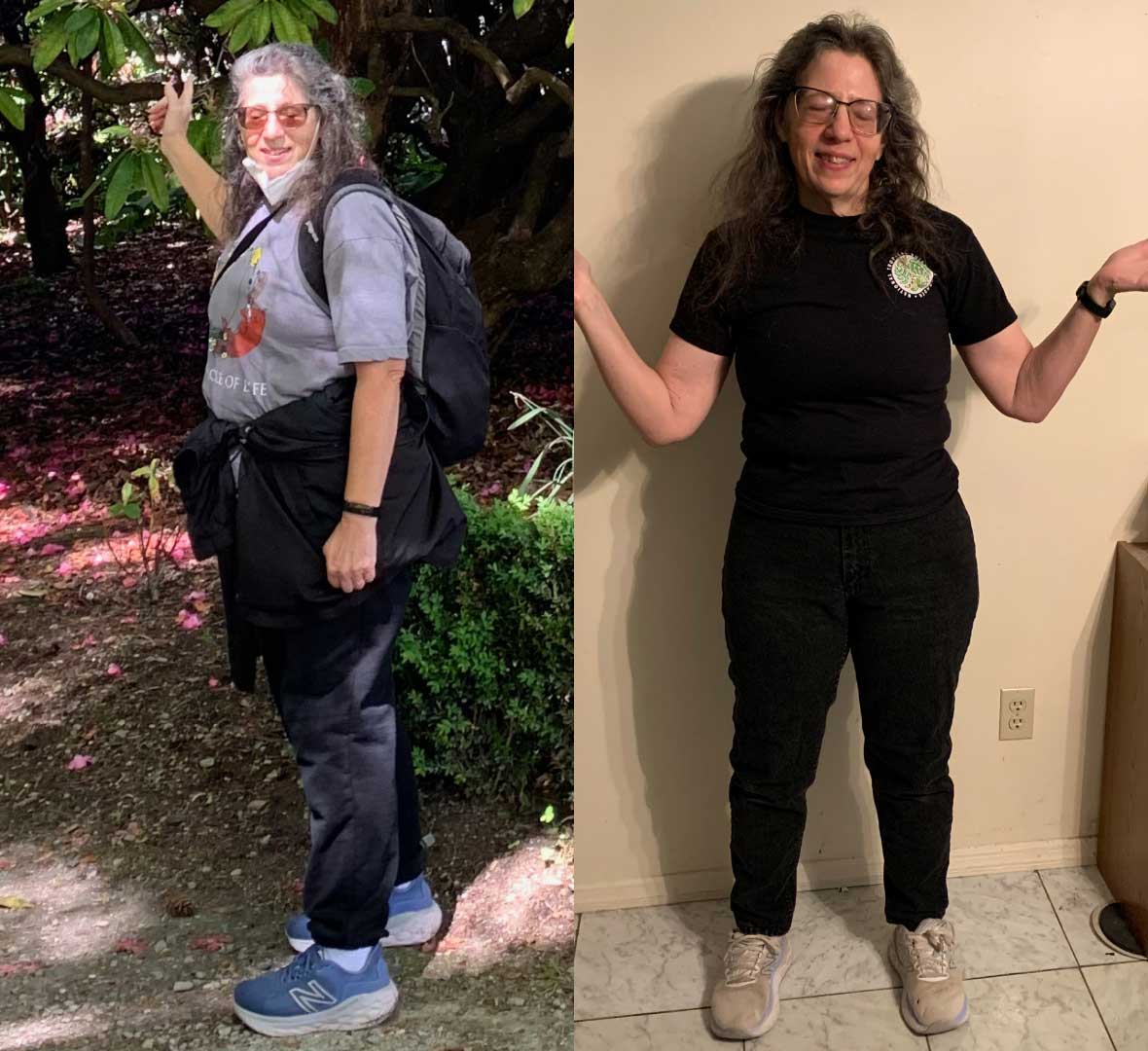This article was originally published in 2019. It has been updated with more insights and information that will help you lose stress weight.
If you think the stress in your life is causing you to gain weight, rest assured that it’s not all in your head. It’s scientifically proven that stress causes weight gain; it’s known to increase appetite, and it also causes the body to store fat.
So that urge you feel to shovel handfuls of M&M’s into your mouth as you try to meet an overnight deadline isn’t a sign of poor discipline – you’re stressed out, and your body is commanding you to eat. And then that stress tells your body not to burn fat, even though you’re sweating bullets during the client-facing presentation you just spent all night working on.
Since it’s impossible to achieve a stress-free life, we need to find ways to manage the hunger and fat storing caused by stress. In this article, I’ll discuss how stress affects the body, what you can do to prevent weight gain from stress, and how to lose weight caused by stress.
Get the free cheat sheet with 10 surprising fat-burning foods.
WHAT IS STRESS WEIGHT?
It’s scientifically proven that stress has a direct impact on weight gain.
When we are stressed, our cortisol hormone spikes. This spike in cortisol causes our body to react in two different ways that impact weight – it increases our appetite, and it tells our body to store fat.
So when we’re burning the midnight oil trying to meet a deadline, the stress we feel encourages us to eat (and given the circumstance, we’re more than likely snacking on something unhealthy). At the same time, our body won’t let us burn fat. Over time, if we’re experiencing bouts of stress on a regular basis, there’s a high likelihood it’s causing weight gain.
HOW DOES STRESS AFFECT THE BODY?
Excessive stress can have long-term effects on your body. A trigger as small as sitting in traffic or running late to a meeting, could propel your brain into defense mode. The “fight or flight” response results in a racing heart, rapid breathing, and contracting muscles, as if preparing for battle. Though this is a healthy response occasionally, repeated occurrences can directly impact your immune, digestive, and cardiovascular system.
WHY DOES STRESS CAUSE WEIGHT GAIN?
Stress can cause weight gain for a variety of reasons:
- Increased appetite
Though stress can shut down an appetite in the short term, long term holds adverse effects. According to research, high stress increases epinephrine and cortisol levels in your blood, throwing off a hormone called leptin, which regulates your appetite. Leptin tricks your body into:
- Thinking it’s hungry even though it’s not.
- Craving an excess of high-fat and sugary foods
The results are short term satisfaction, unhealthy choices, and consuming too many unnecessary calories – leading to weight gain.
- Sleep deprivation
Chronic stress can have a significant impact on our rest, making it more difficult to fall asleep and stay asleep throughout the night. Since stress increases levels of cortisol and adrenaline, our body responds the same way it does to caffeine. We feel more alert, our heart rate increases, and our blood pressure rises. This results in:
– Changing hormones
– A slowed metabolism
– An increased appetite
– Poor food choices
– Decreased energy
– More stress! - Affects the way your body stores fat
Though “stress belly” isn’t a medical condition, it’s still very real and it’s not good for you. In High levels of cortisol can cause your body to store fat, particularly in the abdominal area. Belly fat increases your risk of developing heart problems such as diabetes and heart disease.
HOW TO LOSE STRESS WEIGHT
Stress isn’t going away anytime soon — after all, it’s a part of life. Learning to deal with challenging experiences positively is important to maintaining your physical and mental health. By applying sustainable strategies you can lose that stress weight once and for all.
- Drink less coffee
Stress and coffee are the perfect combination for weight gain. When stressed, adding caffeine raises high cortisol levels even more that they already are — wrecking your metabolism, increasing hunger and anxiety, and creating chronic fatigue.
If you’re ever feeling the pressure, opt for decaf or herbal tea as healthier options. Though you won’t get that immediate and short-lived caffeine boost you’re used to, you’ll find that keeping cortisol levels in check will increase natural energy.
2. Eat an anti-inflammatory diet
Integrating anti-inflammatory foods rich in Vitamin B, Vitamin C, calcium, and magnesium will help reduce inflammation and encourage weight loss – even in stressful times! Whole grains, fibrous bread, oranges, lemons, grapefruit, Greek yogurt, and leafy greens are all packed full of vitamins, minerals, and nutrients. They fill you with the energy you need to keep you energized.
Try to avoid cookies, crackers, donuts, cereal, and pastries. These refined carbohydrates are packed with sugar and since they cause inflammation are notorious to weight gain.
3. Plan ahead
Planning portioned, well-rounded meals for breakfast, lunch, dinner, and snacks ensures nutrient-rich foods every time, while curbing sugar cravings. With proper nutrition, energy levels stabilize and give your body the fuel it needs to finish the day strong.
So next time, instead of snatching a candy bar from the vending machine when you’re short of time, opt for a healthy snack brought from home. By removing unhealthy temptations, you reduce the opportunity to make bad choices and you’ll get to the root of your hunger— fast.
4. Have a cheat day or at least dessert one day a week
It’s impossible to eat well all the time. If you really miss chocolate cake or ice cream, allow yourself one cheat day a week, but make sure it’s something you anticipate and plan for ahead of time. Making a conscious decision of when to indulge will give you something to look forward to without breaking the routine you’re trying to establish.
5. Get lots of protein
When you want to manage stress and lose weight, replace those carbs and fats with protein. Establishing a high protein diet, you can boost your metabolism, make you feel full longer, and burn more calories around the clock—even when you sleep! With all of these benefits, protein is a perfect addition to every meal.
6. Get enough sleep
Ensuring a quality night of sleep is as important for good health as diet and exercise. Good sleep improves your brain performance, mood, and health. Sleep resets your system, increases energy, and even helps boost your metabolism to lose weight faster. Next time you think of starting another episode of Friends, remember the benefits of getting the recommended 7-9 hours of sleep.
7. Don’t limit yourself too much
Research shows that while restrictive diets help you lose weight fast, they can pack on the pounds even quicker. It’s never beneficial to adhere to strict, extremely limited diets with unrealistic guidelines. When beginning your weight loss journey, gradually introduce small changes to maximize results for a healthy long-term lifestyle.
8. Eat slowly
Did you know that scarfing food too quickly can unintentionally result in added belly fat? It’s true. Even consuming healthy food too fast and in large portions can pack on the calories and challenge your digestive system. So next time you take a lunch break, try to make the most of the opportunity for a break and a nutritious meal by savoring every bite.
9. Take a walk
Do some push-ups, stretches, or go for a quick brisk walk. Moving your body and flexing your muscles is an immediate stress reliever. Not only does it fool your body into thinking you’re escaping stress, but it increases blood flow and transports cortisol out of your system allowing you to reboot.
HOW TO LOSE STRESS WEIGHT: KNOWLEDGE IS POWER
As an online weight loss coach, I’ve worked with hundreds of hardworking professional women who regularly encounter stress in their daily lives.
I’ll never forget my client, Tree. Working under stressful conditions at a Fortune 500 company, she noticed her weight creeping up. Though she wanted help, her demanding schedule held her back and limited her options.
After enrolling in my 8-Week Slim Down Jumpstart Personal Weight Loss program and learning how to control her emotional stress eating, she successfully lost 20 pounds. With the added energy Tree gained from losing weight, she started exercising again, and integrated it into her lifestyle transformation.
Tree got control of her emotional stress eating and lost 8 inches from her waist! Get the free cheat sheet with 10 surprising fat-burning foods.
STOP STRESSING AND TAKE THE NEXT STEP
Every day, we find ourselves making decisions that affect others, leaving little time to focus on ourselves and our well-being. Next time you’re late for a meeting, instead of counting on a “satisfying” option at the vending machine, reach for your pre packed lunch, slowly enjoy it, and appreciate it for all its nutritional goodness – your body will thank you.
My clients come to me for a lot of reasons, but they all are determined to rediscover their best selves and get healthy doing it. Check out other motivational weight loss stories from my clients who have transformed their bodies through my online weight loss coaching programs.
Then, book a call with me and share your goals towards a stress-free life once and for all. After all, you deserve to live a healthy life in the body you’ve always dreamed of.
Curious if an online weight loss program is right for you? Take this weight loss quiz to find out!





































Reader Interactions